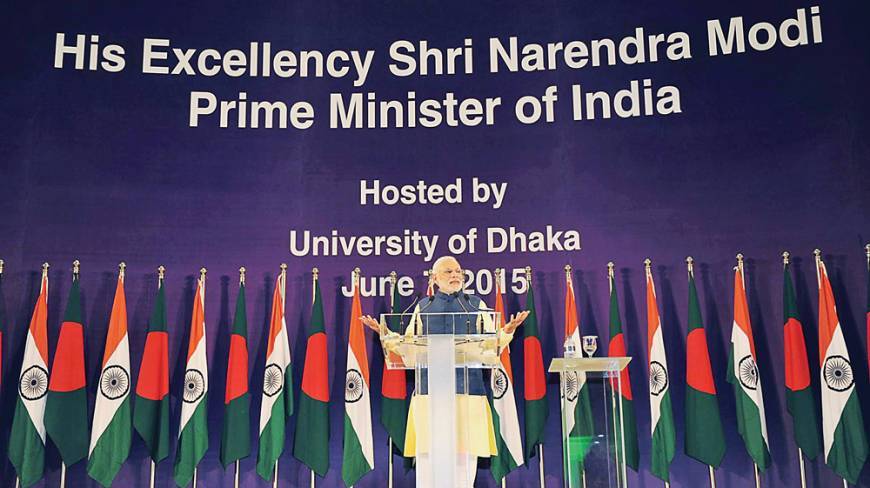Indian Prime Minister Narendra Modi yesterday made an ardent call for his country and Bangladesh to work together for the betterment of their people and the region.
“The whole world will see that we are not just side by side, but together,” he said in a public speech at the Bangabandhu International Conference Centre yesterday.
In his hour-long speech, Modi discussed bilateral cooperation and stressed working together to make a better world for the next generation.
Modi arrived in Dhaka at the invitation of Prime Minister Sheikh Hasina Saturday and left Dhaka for Delhi last night.
He decried the mistrust between Bangladesh and India and praised the development of the two countries.
The speech was the last event of Narendra Modi’s itinerary during his two-day visit.
“This is my last programme but I feel that I start my journey now,” he said.
The Indian prime minister said if the wall of a poor neighbour was not strong, it would not help its rich neighbour.
“If Bangladesh progresses, it will be good for India,” he said in his speech delivered in Hindi.
Recalling an experience in China, Modi said the chief executive officer of a company had asked him how it was that India was such a big country but its small neighbour, Bangladesh, was the second biggest exporter of ready-made garments in the world.
“What do you think? What was the feeling of Modi after hearing this? I am telling you the truth: I felt very happy,” he said.
In his speech, Modi recounted the glory of Bangladesh’s Liberation War and said he felt proud that India had helped Bangladesh achieve independence.
“I have an emotional attachment to Bangladesh,” he said.
He said he felt proud that Bangladesh had honoured his political guru, Atal Behari Vajpayee.
Modi received an honour bestowed on Vajpayee by the Bangladesh government from the hand of a freedom fighter in the presence of a daughter of Bangabandhu.
Bangladesh conferred the Liberation War Honour on Vajpayee for his outstanding contributions during the country’s struggle for independence in 1971.
President Abdul Hamid handed over the honour to Modi in the presence of Hasina.
Modi praised the Bangladeshi prime minister and said the two premiers shared the same concern: “We both only think about development, development and development.”
He is the first Indian prime minister to say that water was a human issue and should not be made a political one.
“I came to Bangladesh and did not talk about Teesta? That could not happen,” he said.
He said he was working on the water sharing issue with different states in India and that New Delhi was working on it with Dhaka as well.
“I believe it can be solved. Please give me some time,” he said.
On finally implementing the Land Boundary Agreement, he said: “Had it happened in another part of the world, we would have been nominated for the Nobel Prize.
“Because we are poor countries, nobody talks about us.”
About the empowerment of women, Modi said many countries in the world do not accept the leadership of women.
“India, Pakistan, Thailand and Sri Lanka had women leaders,” he said, adding that Bangladesh’s prime minister, leader of the opposition and pro-vice chancellor of Dhaka University are all women.
“For the last two days, I have travelled to different parts of the city and I saw a billboard of a woman and the words ‘I’m made in Bangladesh’ was written on it,” he said, referring to a campaign poster by the Dhaka Tribune.
Modi said he felt the billboard of woman cricketer Salma Khatun represented women’s empowerment and the strength of the youth. “We feel proud when we hear about women’s empowerment and the strength of youth.”
He stressed regional connectivity and said something big would soon happen to increase connectivity in the sub-region.
Bangladesh, Bhutan, India and Nepal will be signing the Motor Vehicle Agreement on June 15 to facilitate the movement of vehicles in the sub-region.
“The region cannot improve without connectivity and the countries of the region must foster it,” he said.
Source: Dhaka Tribune










